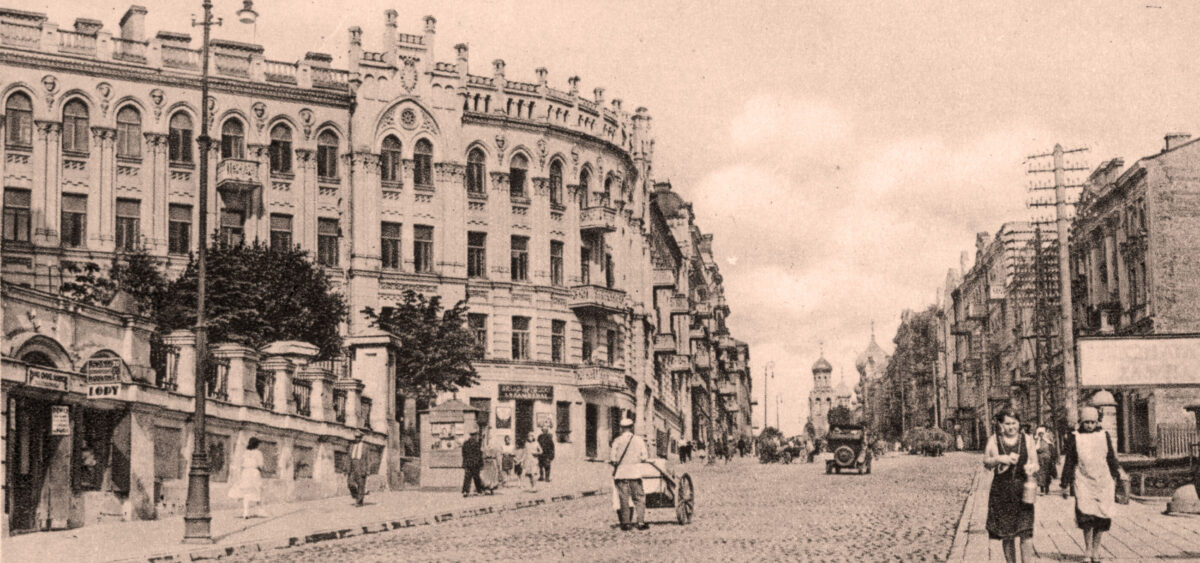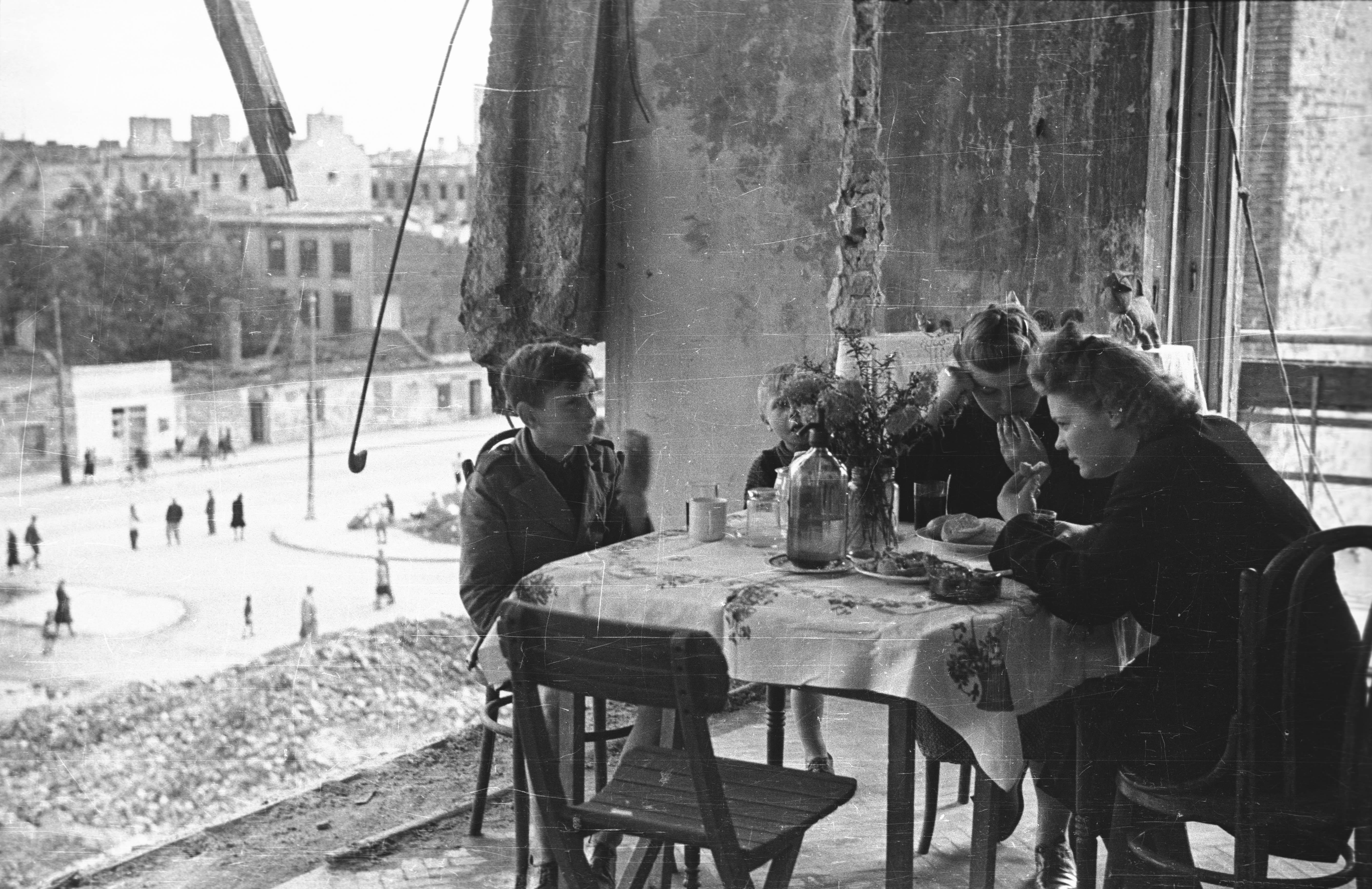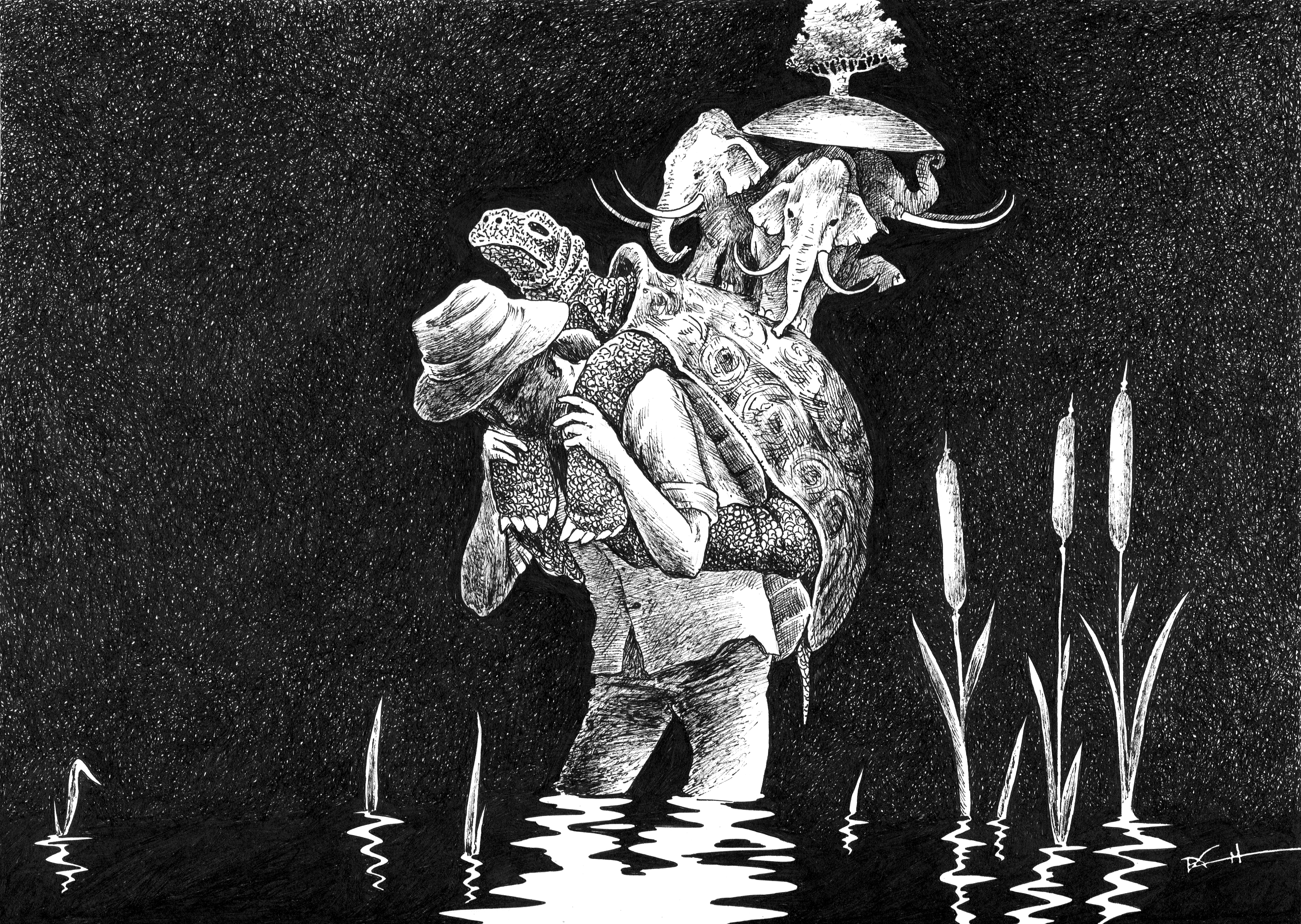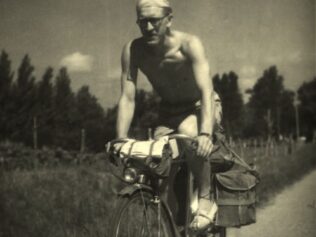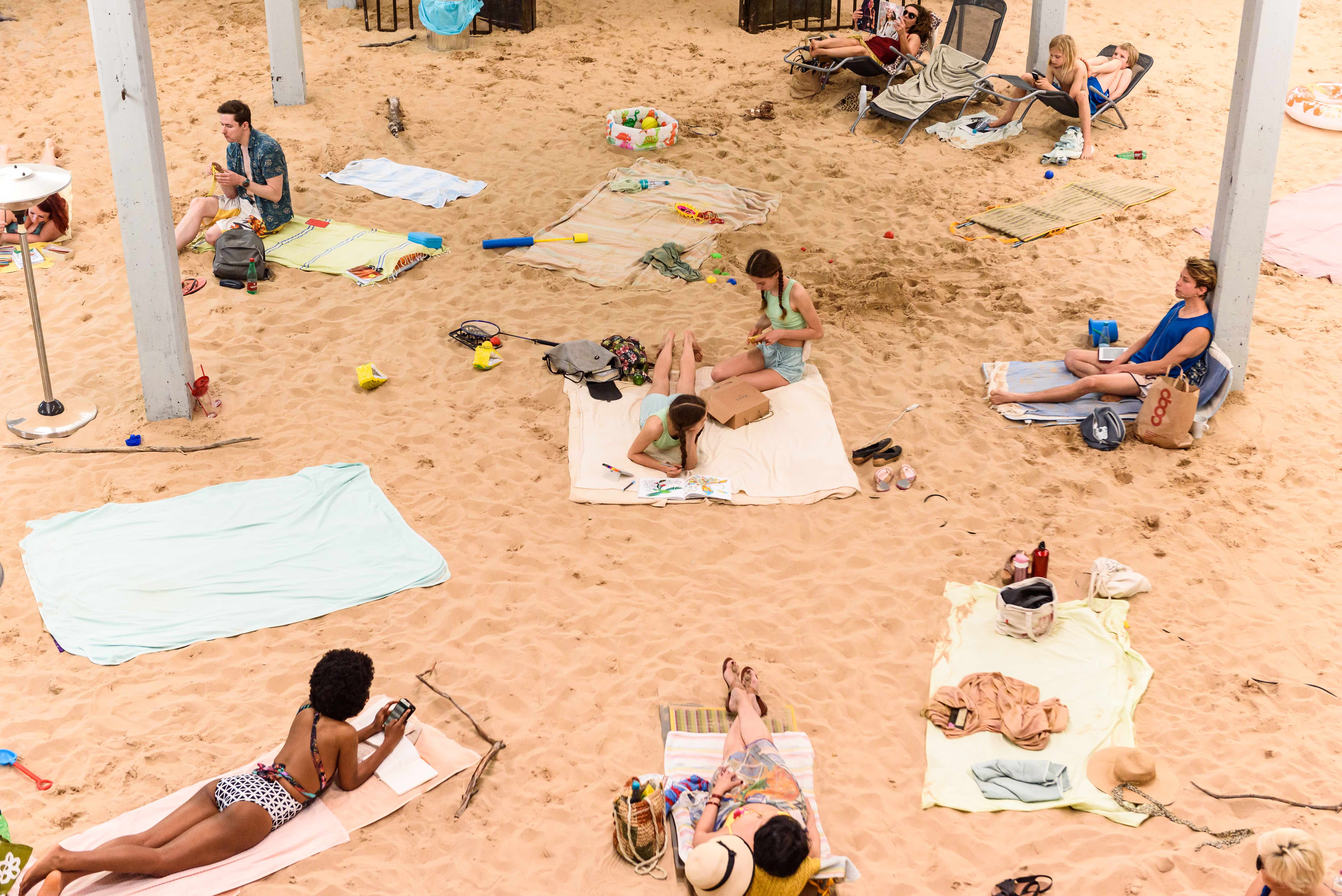
Vilnius, the 1930s. Jadwiga and her friends are pupils at the local Queen Jadwiga’s School, living their tumultuous teen lives in the years leading immediately to World War II. The war will soon put an end to their world, and yet, at this very moment, their lives are very much about normal teenage stuff – like going to the movies to see Mata Hari on screen, or smoking their first cigarettes, Feminas. In the excerpt below, Kristina Sabaliauskaitė revisits a Vilnius-Wilno-Vilne that is no more; a multicultural city, with entangled Polish, Jewish and Lithuanian history; a place where, as she says, “first impressions are often deceptive.”
If you were to ask anyone in Vilnius today where Queen Jadwiga’s School is – no one would even know what you were talking about. The only royal things left in today’s Vilnius are King Mindaugas Bridge and the monument next to it, commemorating Lithuania’s only crowned king, standing in such a way that, according to today’s young Vilnians who are not short of wit, if you were to look at it from a certain angle it would seem he was holding not a sword but amusing himself by pulling on his royal member. But nobody would have heard of Queen Jadwiga’s School. And only a guide who is a ghost, risen from a grave with a moss-covered angel leaning over it in one of Wilno’s old cemeteries – the Rossa, the Bernardine, or St Peter and Paul’s – would have been able to have shown you the school.
Queen Jadwiga’s girls’ high school before World War II was in a building marked with the number 19 on St Anne’s Street. By the way, no one today will be able to show you St Anne’s Street either. Nor will you find it on a map of the city. Not unless you had a special map – of a completely different Vilnius that has disappeared and is no longer visible. A ghostly map of Wilno in which only dead souls reside. A city with the Bristol and George hotels, with all three Sztrall cafés – the White, the Green and the Red, the Pohulanka and the White Pillars, formerly marking an entry into Wilno, the Jewish Credit Bank, located with real Wilno irony in German Street, Stefan Batory University and its students wearing their velvet caps. So, in such a city there undoubtedly was a St Anne’s Street and a girls’ high school at number 19. Today none of that is there any more because the times have changed, as well as the people, for whom priests have become more important than saints, and for that reason St Anne’s Street is now called Maironis Street after the priest Maironis; the name of the Holy Queen Jadwiga has disappeared from the map and from memory together with the high school, while almost all of the girls who attended that school are now singing in a heavenly choir. Although, if you had known them better, you would not be so certain of that. Some of them even then were not angels, so most probably they are not singing hymns in paradise but chansonettes several levels below – in a devilish cabaret in hell. So what if romantic-looking, moss- covered angels are to be seen leaning over the graves of many of them… That means absolutely nothing – this is Wilno, where first impressions are often deceptive.
And how do you imagine those schoolgirls looked? Here they are, ten-year-olds, wound as tight as piano strings – then, around 1935, still in truth real angels – singing in their heavenly voices under the direction of the school chaplain to Marshal Piłsudski himself the Masurian folk song ‘Kukułeczka kuka’ (‘The Little Cuckoo Sings’), about a farm boy looking for a girlfriend while a cuckoo sings cuckoo, and a tear is seen glistening in the Marshal’s eye because of the innocent beauty of the singers. Jadwiga, a ten-year-old, agreed to sing the solo part – but only on the condition that she would not have to stand in the front, and that is why she is now standing safely in the third row of the choir. But that ploy fails. ‘And where’s the cuckoo herself,’ asks the Marshal at the end of the number. A quiet giggle works its way through the choir and a pale, small girl with bangs who looks like she is wasting away is pushed against her will to the front. To the envy of her friends and to the even greater envy of the unmarried female teachers, the great Marshal Piłsudski smiles and even strokes her cheek. But this leaves no impression on our little Jadwiga, who in general does not like being touched by strangers, marshals or not. And she really does not like being pushed from the ranks of the choir to the front.
In general, the girls in this class at the Queen Jadwiga high school are not that easy to handle. Childhood is childhood, but here they are again, now sixteen years old.
The Lithuanians came into Wilno several years ago. It is strange, when you think of it, that until recently the shout ‘to Kowno, to Kowno’ was being chanted in the streets and that giant choir by Cathedral Square had also swept up Jadwiga – she was on her way home, she had to cross the square, and turning towards Mostowa, the Bridge Street, they, the marchers, sucked her in, took her by under her arms, there were one or two familiar faces among them, mainly young faces, with burning eyes and hundreds of open mouths, emitting a thundering sound, breaking against the walls of the surrounding buildings as if stormy waves were battering a sea wall, and she did not notice how she had been trapped by being held under her arms, she covered almost a whole block, and half way along she began to gasp for air, she began to think of getting loose, but someone’s sharp elbows stabbed her sides, going painfully into her ribs, she somehow managed to get free, almost tearing off the sleeve of her jacket, almost falling on to her knees, and with difficulty managed to negotiate her way to a side street where she was able to catch her breath. The worst thing was not her battered sides, not the stitching of the sleeve coming apart at her shoulder, but the understanding that for several moments she had completely drowned, disappearing into that sea of people and, it seems, she herself without even being aware of it, had been shouting with them. From that day on, up to the end of her life, she would not be able to tolerate and would be afraid of choirs and large crowds. Like those who for no good reason cannot stand the echoing sound of a tap dripping or the sound of a finger being swiped across a pane of glass. Like a finger being swiped across glass or like a brick being rubbed against another brick, now there was a new sound coming from a crowd, not as large as before, to tell the truth, chanting in Lithuanian ‘Vilnius is ours.’ It is also frightening, but with the arrival of the Lithuanians in Wilno, some things improve and no one will dispute that – in Wilno, after a blockade lasting several years, there are more kielbasa sausages and, in general, more good meat products – hams, roulades, chopped meat, the Lithuanian skilandis, and polendvitsa; the Lithuanians are good farmers, good producers, for them a good life means, first and foremost, good food, and now it is a matter of honour for them to show the inhabitants of Vilnius what a good life in a new Lithuania means. True, they look with great suspicion on the locals – so what if Jadwiga’s mother who knows several languages and can type, under pressure because of the shortages suffered by her family, is only able to get a job as a tea lady – so what if in Lithuania’s central bank ‘I was once a lady and now am a tea lady’, as she says jokingly, even though in these turbulent times seven grown children are no joke, with only the father in work.
But Jadwiga still sings in the choir. True, now it is of her own free will, no longer afraid to stand in the front to sing solo parts – that being the only way for her to conquer the fear of singing in a choir. With the choir behind her, she knows she will not be swallowed up – all she has to do is to slow down or speed up the tempo to know that if she were to climb down off the stage chaos would ensue, to know that she can stand there on her own, that she will not be swallowed up. That is why she is singing ‘Kukułeczka kuka’ again – with the young ladies lined up in the same way. Outside the window the war has started, but do not think for one moment that something as insignificant as war can take the pleasures of life away from them. So what if in this photograph, lined up, they look unimpressive – with their dark uniforms, pale, still with children’s hair styles, skinny, with nothing interesting about them.
However, that is just an optical illusion, just a trompe-l’oeil, as in a term used by their young female French teacher. As with many things in Vilnius – in the city, where under layers of plaster incredible ancient frescoes lie hidden and where above the streets there are impassable arch-bridges, connecting only the walls but not the houses and their residents. Nothing in this city is what it appears to be at first glance.
Do those girls in the photograph look uninteresting, like wallflowers? Not a bit of it. Half of them are femmes fatales in disguise.
For example, no one knows, apart from a few of her classmates, that Hanka wears a genuine flesh-coloured satin French corset with black French lace. To it, to the fancy hose supporters with striped ribbons, are attached not silk, but ordinary, poor-quality cotton stockings so as not to arouse the suspicion of the teachers. The fifteen-year-old chaste girl got the corset by saving her pocket money after having seen one in a film with Pola Negri, and this is her secret. Urszulka wears the same kind of stockings, but after lessons she became adept at taking them off and with a practised hand drawing seams on her bare legs – having before doing that rubbed them with some sort (her secret!) of brown ointment – so that she would look like she is wearing stockings. Like a real lady. And here is Zorika, looking like a stubborn dark-coloured bull, with a low forehead and two pigtails hanging down either side of her head. Her father was originally from Montenegro and her mother from Wilno, but the Montenegrin blood had clearly won out because Zorika, called simply Zośka by everyone, is extremely mischievous and would even come to school sometimes with eye makeup on. Half of them already smoke – because of the war which had just begun, the parents are paying less attention to their young daughters, besides which, one of Jadwiga’s brothers works in a tobacco shop, and she, shamelessly by using various forms of blackmail, is getting cigarettes out of him. She herself smokes only the very best cigarettes for ladies called Femina, the ones with shiny red paper on the end so that no trace of lipstick could be seen on them. Even now, a just-opened packet of cigarettes is in her pocket. But none of that could be seen in the photograph and, of course, nobody knows anything about that. Nobody knows – but would soon know that she had, a quarter of an hour ago, nailed the religious instruction teacher’s galoshes to the floor. There will be laughter when he, after the lesson, will, as is his custom, put his feet into them and try to walk. In the same way that nobody knows that Jadwiga’s secret dream is to be a spy – like Mata Hari in the film with Greta Garbo. Only her life is not going to end so sadly, oh no! Love and espionage are incompatible, the heart of a spy has to be free! Jadwiga’s heart would belong to nobody, and for the time being she is practising her trade by quietly spying on both of her sisters and her four brothers, in particular the oldest one, who is studying sculpture at the Department of Fine Arts of Stephen Batory University in Wilno and, as befits a real artist, is breaking the hearts of the fair sex to the left and the right of him.
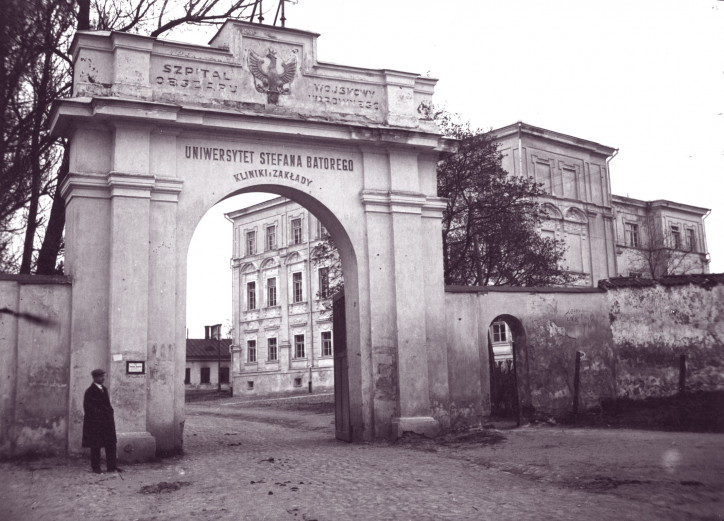
Art and love are inextricably linked – the young girls from the Virgin Queen Jadwiga high school come to this conclusion after observing Jadwiga’s brother’s success among the ladies. To sin in the hope of becoming a muse and being immortalised in bronze or at least in alabaster – that is somehow more dignified than just committing a banal sin. Love and art are inextricably linked – or if not love then ‘it’, about which they speak under their breath and why the priest from the pulpit thunders every Sunday, and after lessons on weekdays they would quietly creep into Jadwiga’s parents’ house by St George’s Church, quietly, quietly, while nobody is there, into her brother’s, the sculptor’s room – to look at art albums. And at anatomical atlases for sculptors. Up till now they had only seen ‘it’ on paper, only on the pages of books, only on the reproductions of Michelangelo’s David, on one or two Greek sculptures and one or two pictures, mostly by Rubens, mostly peeping out of the stomach of some obese faun. They still are not able to make up their minds if it is disgusting or dangerously tempting.
True, Basia has already tried kissing. True – unsuccessfully. Władek, after taking her home secretly from the cinema na Podwalu, on Rampart Street, amongst the profusion of blossoms on the lilac trees, as if in an advertisement for soap, suddenly kissed her. He even tried to insert his tongue between her lips. ‘And how was it?’ – ‘Like a wieloryb, like a whale. Ugh, he was even drooling,’ – Basia cannot understand why all films end in a kiss. ‘It’s not worth it,’ she says in the voice of an expert. But the consilium of girls comes to the conclusion that perhaps Rudolph Valentino or Clark Gable or Ramon Navarro kiss differently. Oh, those are dream men. Their dream man is, without a doubt, the charming Pan Wedel – the son of the famous Warsaw chocolate manufacturer, in charge of the Wilno branch. Jadwiga’s sister, the beautiful Janina, with all of Wilno captivated by her luxurious, abundant hair, is acquainted with him – they attend the same balls. Jadwiga, the youngest in the family, looks with envy at how Janina is getting ready for a soirée at the Tyszkiewicz Palace and is twisting her long hair, almost reaching the floor, into an impressive up-do and pins to it a small cluster of aromatic purple lilacs. Jadwiga does not understand why Janina is not doing anything to make him lose his head – she could, if the worst comes to the worst, accept Pan Wedel as her brother-in-law. At least then there would be no shortage of chocolate in the house. True, Pan Wedel is already married. However, that seems like a completely insignificant detail, easily overcome – at least on the silver screen.
Everything depends on how one looks at things.
‘A woman of loose morals’ not so long ago was the greatest insult one could make, but now after Jadwiga’s eldest sister has become a woman of loose morals it does not seem like anything so terrible. She was called this by the archbishop himself after the seventeen-year-old Helena left Queen Jadwiga’s School without graduating and in a secret wedding married the handsome lieutenant Konrad before he went to fight on the front; so that both of them could, as it were, taste the sweet fruits of love. This is what His Excellency told Jadwiga’s father, now working as the curia’s barber, when he had summoned him: ‘Since your daughter is a woman of loose morals from now we will be reducing your wages.’ What a nasty piece of work the archbishop is, thinks Jadwiga to herself. But the father is not angry, basically it is not in his character to want revenge, how otherwise could he work with a cut-throat razor held to the soaped-up chins of His Excellency and his prelates? ‘The most important thing, my children, is that you were able to find joy in one another,’ he says mysteriously to Helena, who is now living the life of a living man’s widow in Konrad’s pretty flat in the Montwiłł Mansions, in one of the Dutch-style houses by Lukiszki Square. There is around her such a limpid mist of grief as if it were a funeral shroud, while she herself is so translucent and pale, that Jadwiga does not even dare to ask her anything about the sweetness of the fruits of love.
The eve of the war and its very beginning will later for some reason be remembered by them, that is by those who will survive the war, as the warm evenings of an early summer suffused with the aroma of lilacs and mock orange. Today in Vilnius passion still has this aroma, which every spring hangs in the air – the aroma of lilacs, of sweet mock orange, as well as of the dust of the Old Town after rain and the smell of mould and incense escaping through the doors of a church like a memento mori. Oh, yes, the churches and the nunneries – a young nun, who is teaching some lessons to girls and at the same time is shining some light on female matters during moral education classes, says that a decent young woman should be very careful and first see if a young man respects her or not. Do not burn a candle during the day, dear young ladies, says the nun. There is a time for everything. It is acceptable to go and see a decent film (best of all would be documentaries and not anything with kissing since that can only serve to arouse a young man). If the intentions of a young man are serious – it is acceptable to give him one’s hand or even to walk arm in arm. However, a young woman should take hold of the arm in a dignified and elegant fashion and on no account make any movements, apply any pressure or do anything else like that. Under no circumstances should one draw one’s finger across a young gentleman’s palm – he might take that as a sign that the young woman is easily available and then only trouble would follow. It hardly needs saying that after these instructions, the great majority of the girls attending the Queen Jadwiga School when in a cinema, on walks under the flowering lilac trees, in the side streets in the evening brush the palms of those young men still left in Wilno with hope in their hearts.
And there are less and less of those young men.
The war in Wilno begins several years before it is declared – as the mad vision of a poor nun cook of the Merciful Mother of God sisterhood, by the name of Faustyna. No one believes her, like no one believed Electra – why would anyone believe a kitchen maid, someone who tends to the weeds in the garden, accepted into the nunnery without a dowry, without an education and any training, and seeing her visions, as the other nuns joke, in the bottom of a shiny pot? They, the nuns from good families, are really not at all merciful. ‘Sister Faustyna is speaking with Lord Jesus again,’ they giggle every time they come across poor Faustyna scrubbing pots. ‘I saw our Lord again, there will be a great war, a bloody war, there will be no stone left standing in Vilnius, let us pray to the Lord Jesus, let us put our trust in him,’ – Faustyna is really irritating, going on to her confessor about the Divine Mercy image with rays coming out of His heart, which she has to paint and write on it the words Jezu, ufam Tobie, ‘Jesus, I trust in you’, and the confessor, a clever man, knows that it is best not to make light of those visions, the Vatican does not like it, and for this reason recommends that Faustyna undergo a psychiatric examination. But what can one do, when it becomes clear that the nun gardener is of completely sound mind, and on top of that is asking for an audience with the archbishop himself, whom she has to warn, absolutely must warn of the war that is on the horizon.
This excerpt is taken from Kristina Sabaliauskaitė’s “Vilnius. Wilno. Vilna. Three Short Stories”, translated from the Lithuanian by Romas Kinka, published in 2015 by Baltos lankos.


